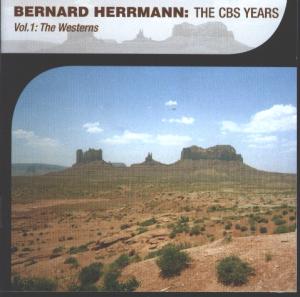The CBS Years Vol.1: The Westerns
Bernard Herrmann
Have Gun Will Travel Pilot: "Three Bells to Perdition"
Western Suite
Gunsmoke: "The Tall Trapper"
The Indian Suite
Western Saga
Available On: Prometheus PCD 152
Running Time: 68.1

These TV series scores were written in the period 1956 to 1961. As Jon Burlingame says in his notes for this album, "Herrmann was, when he wrote most of this music, at a high point in his cinema career, between scores for Alfred Hitchcock (The Man Who Knew Too Much was behind him, Vertigo just ahead) and the great Ray Harryhausen fantasy films (he would soon embark on Seventh Voyage of Sinbad.)" Influences of all these film scores are heard in this compilation. Vertigo's sense of mystery and unease is felt in the opening Have Gun Will Travel music scored imaginatively and very atmospherically and dramatically for brass and percussion. Bernard Herrmann, as somebody said, "was a master of the repeat sign". Here as usual he uses small cell clusters ingeniously repeated and modulated to heighten his effects. The brass brags, canters, gallops, neighs, snarls.
Throughout this compilation small ensembles are used (frankly for economy because of the musicians unions' exorbitant charges). Harp, woodwinds and percussion are employed again most effectively for atmosphere and suspense through the nine short movements of Western Suite: 'Prelude'; 'The Ambush'; 'Tranquil Landscape'; 'Dark Valley'; 'The Meadows'; 'Bad Man'; 'Gun Fight'; 'Rain Clouds'; and 'Sun Clouds'.
'The Tall Trapper' from Gunsmoke had a slightly larger ensemble of ten strings, two French horns, and two bassoons for music which begins in melancholy mood before a galloping motif and a more lyrical episode. The Indian Suite ('Indian Ambush'; 'Echo'; 'Indian Signals' and 'Indian Fight') was used as library material for a number of series including Rawhide, and it too had material confined to twelve players of brass and percussion. This combination was also utilised for arguably the best, the most musically satisfying selection here, Western Music (recorded in London in 1957). Its nine movements are: 'Prelude' (ideal for climactic duels); 'Street Music' (busy, bustling music and unusually for Herrmann something of a tune (even though it turns sour), in Mexican/Latin then Indian mode; evocative, spacious 'Open Spaces'; 'The Hunt' (very Harryhausen); 'The Watching' tense with tuba prominent; 'The Canyons' very much an extension; 'Gunsmoke' sour, snarling brass and timpani rolls screwing up the tension; 'Gunfight' as 'Gunsmoke' even more so; and 'Victory', a swaggering celebration.
Interesting, dramatic and atmospheric TV theme music using limited resources. This compilation will appeal mainly to students of Herrmann, and Herrmann completists.
Ian Lace
31/2
Gary Dalkin adds:-
see also FMOTW's review of Vol.2 in this series, which finds Herrmann back in more familiar "American Gothic" mode.
Return to Index